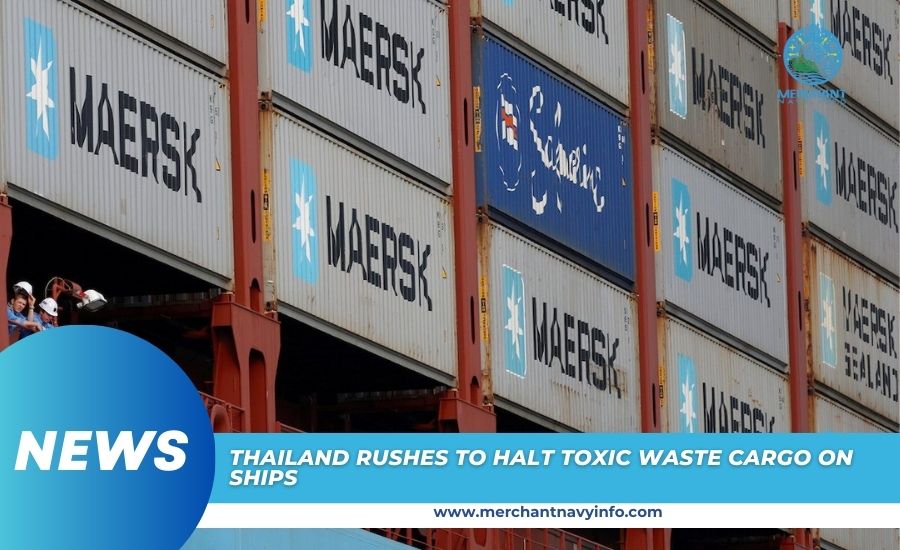
Thai authorities are racing to stop about 100 containers allegedly filled with hazardous industrial waste from Albania from arriving at the country’s ports.
The Basel Action Network, a U.S. nonprofit that tracks the toxic trade and has previously warned Malaysia about illegal e-waste shipments, notified Thailand last week. The containers it believes are filled with potentially harmful electric arc furnace dust are coming.
Thailand Races To Stop Toxic Waste Shipments By Ship
In addition to the warning, one of the ships carrying the containers is no longer visible on maritime location tracking services. It was pitch dark as the plane approached Cape Town late last month. After the Basel Action Network said it had alerted South African authorities about the shipment.
After receiving notification that the containers were loaded on a ship in Albania in early July. Thai officials said they were working with counterparts in Albania and Singapore to stop the shipments. The ships were scheduled to dock in Singapore later this month.
In an email, the Industrial Enterprise Administration of Thailand, which oversees international waste management, said that the relevant government agencies “were neither notified nor approved” of the shipments. “We are currently coordinating and monitoring to prevent this illegal trade.”
Thailand and other Southeast Asian countries are experiencing an influx of trash, ranging from dirty plastics to industrial and electronic waste full of toxins. Under the United Nations Basel Convention, a global agreement signed by many developed economies, countries need to agree to ship waste to their own countries.
According to the Basel Action Network, the containers were on the Campton and Candor ships of A.P. Moller-Maersk. Maersk confirmed that another shipping company had booked its two ships carrying containers that originated in Albania.
Company spokeswoman Summer Shi said in an email that none of the containers were declared to contain hazardous waste. Otherwise, Maersk would have refused to transport them.
“Due to speculation about the contents of these containers, Maersk will deliver the containers to the shipping companies. That booked the relevant containers and are responsible for them,” she said.
Bloomberg News could not independently verify the ships’ contents. The companies that exported and received the containers have not yet been identified.
The issue has raised concerns.
Basel Action Network and Thailand Ecological Alert and Recovery environmental groups have alerted several countries. After learning that more than 800 tons of electric arc furnace dust had been loaded onto ships in Albania. Then shipped to a Maersk container ship in Trieste, Italy. Online shipping data shows that MSC Mediterranean Shipping Company S.A. ships are also involved in the transportation, with Thailand as the final destination.
The furnace dust that needs to be processed is hazardous waste, usually from scrap steel recycling. It contains toxic metal oxides such as cadmium and chromium, which harm health and the environment.
According to data on the MSC container tracking website, on July 4, 40 20-foot containers were loaded onto the Conship Vow at the Albanian port of Durres. A few days later, they were transferred to the Maersk Campton in Trieste. And are scheduled to be transferred back to an MSC ship in Singapore on August 18.
It is expected to arrive at the Thai port of Laem Chabang on August 20.
Meanwhile, another batch of about 60 containers, originally loaded on an MSC ship from Albania, is now on the Maersk Candor, bound for Singapore.
The Campton stopped streaming from its website on July 31. Maersk said the ship was not scheduled to stop in South Africa and that it was not unusual for ships to stop broadcasting their positions for safety reasons. Maersk said the ship is now sailing in the Indian Ocean to Singapore.
The Campton is expected to dock in Singapore on August 14, and the Candor will arrive on August 22. After that, the containers filled with the so-called kiln dust will be shipped to Thailand.
MSC did not respond to a request for comment, and Albanian and Singapore port authorities. Which is responsible for authorizing the export of waste, also did not respond.
“The next few days are critical and Singapore and Thailand must take action to stop these ships,” said Jim Puckett, the Basel Action Network executive director.
He added that Albania must recover the containers and ensure the waste is not re-exported to another unexpected destination.
“It is very easy for traders and industry to load containers with material. That would otherwise cost a lot to properly dispose of,” he said. “The generators of this waste and any Thai partners who agree to accept this shipment. It must be prosecuted to deter future traffickers,” he added.









